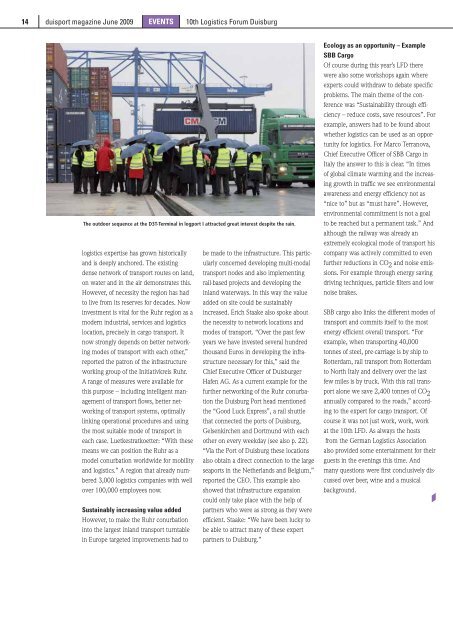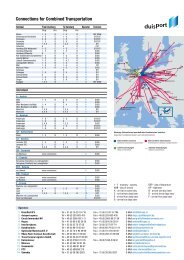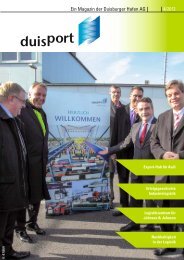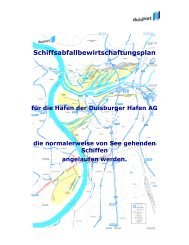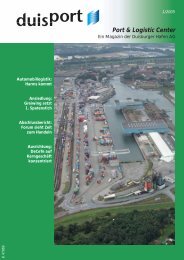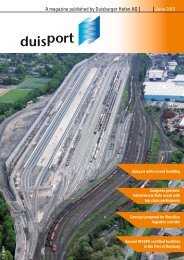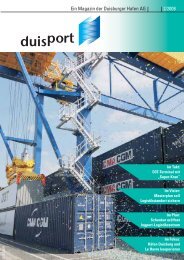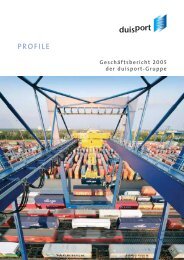A magazine published by Duisburger Hafen AG June 2009 - Duisport
A magazine published by Duisburger Hafen AG June 2009 - Duisport
A magazine published by Duisburger Hafen AG June 2009 - Duisport
Create successful ePaper yourself
Turn your PDF publications into a flip-book with our unique Google optimized e-Paper software.
14 duisport <strong>magazine</strong> <strong>June</strong> <strong>2009</strong> EVENTS 10th Logistics Forum Duisburg<br />
The outdoor sequence at the D3T-Terminal in logport I attracted great interest despite the rain.<br />
logistics expertise has grown historically<br />
and is deeply anchored. The existing<br />
dense network of transport routes on land,<br />
on water and in the air demonstrates this.<br />
However, of necessity the region has had<br />
to live from its reserves for decades. Now<br />
investment is vital for the Ruhr region as a<br />
modern industrial, services and logistics<br />
location, precisely in cargo transport. It<br />
now strongly depends on better networking<br />
modes of transport with each other,”<br />
reported the patron of the infrastructure<br />
working group of the Initiativkreis Ruhr.<br />
A range of measures were available for<br />
this purpose – including intelligent management<br />
of transport flows, better networking<br />
of transport systems, optimally<br />
linking operational procedures and using<br />
the most suitable mode of transport in<br />
each case. Luetkestratkoetter: “With these<br />
means we can position the Ruhr as a<br />
model conurbation worldwide for mobility<br />
and logistics.” A region that already numbered<br />
3,000 logistics companies with well<br />
over 100,000 employees now.<br />
Sustainably increasing value added<br />
However, to make the Ruhr conurbation<br />
into the largest inland transport turntable<br />
in Europe targeted improvements had to<br />
be made to the infrastructure. This particularly<br />
concerned developing multi-modal<br />
transport nodes and also implementing<br />
rail-based projects and developing the<br />
inland waterways. In this way the value<br />
added on site could be sustainably<br />
increased. Erich Staake also spoke about<br />
the necessity to network locations and<br />
modes of transport. “Over the past few<br />
years we have invested several hundred<br />
thousand Euros in developing the infrastructure<br />
necessary for this,” said the<br />
Chief Executive Officer of <strong>Duisburger</strong><br />
<strong>Hafen</strong> <strong>AG</strong>. As a current example for the<br />
further networking of the Ruhr conurbation<br />
the Duisburg Port head mentioned<br />
the “Good Luck Express”, a rail shuttle<br />
that connected the ports of Duisburg,<br />
Gelsenkirchen and Dortmund with each<br />
other on every weekday (see also p. 22).<br />
“Via the Port of Duisburg these locations<br />
also obtain a direct connection to the large<br />
seaports in the Netherlands and Belgium,”<br />
reported the CEO. This example also<br />
showed that infrastructure expansion<br />
could only take place with the help of<br />
partners who were as strong as they were<br />
efficient. Staake: “We have been lucky to<br />
be able to attract many of these expert<br />
partners to Duisburg.”<br />
Ecology as an opportunity – Example<br />
SBB Cargo<br />
Of course during this year’s LFD there<br />
were also some workshops again where<br />
experts could withdraw to debate specific<br />
problems. The main theme of the con-<br />
ference was “Sustainability through efficiency<br />
– reduce costs, save resources”. For<br />
example, answers had to be found about<br />
whether logistics can be used as an opportunity<br />
for logistics. For Marco Terranova,<br />
Chief Executive Officer of SBB Cargo in<br />
Italy the answer to this is clear. “In times<br />
of global climate warming and the increasing<br />
growth in traffic we see environmental<br />
awareness and energy efficiency not as<br />
“nice to” but as “must have”. However,<br />
environmental commitment is not a goal<br />
to be reached but a permanent task.” And<br />
although the railway was already an<br />
extremely ecological mode of transport his<br />
company was actively committed to even<br />
further reductions in CO 2 and noise emissions.<br />
For example through energy saving<br />
driving techniques, particle filters and low<br />
noise brakes.<br />
SBB cargo also links the different modes of<br />
transport and commits itself to the most<br />
energy efficient overall transport. “For<br />
example, when transporting 40,000<br />
tonnes of steel, pre-carriage is <strong>by</strong> ship to<br />
Rotterdam, rail transport from Rotterdam<br />
to North Italy and delivery over the last<br />
few miles is <strong>by</strong> truck. With this rail transport<br />
alone we save 2,400 tonnes of CO 2<br />
annually compared to the roads,” according<br />
to the expert for cargo transport. Of<br />
course it was not just work, work, work<br />
at the 10th LFD. As always the hosts<br />
from the German Logistics Association<br />
also provided some entertainment for their<br />
guests in the evenings this time. And<br />
many questions were first conclusively discussed<br />
over beer, wine and a musical<br />
background.


